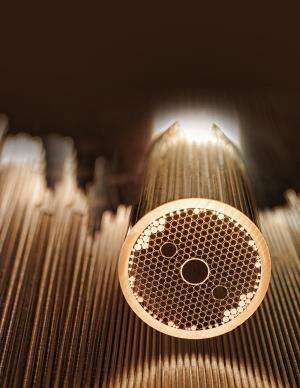Hollow-core fiber assembly. Credit: OFS
The intensity of light that propagates through glass optical fiber is fundamentally limited by the glass itself. A novel fiber design using a hollow, air-filled core removes this limitation and dramatically improves performance by forcing light to travel through channels of air, instead of the glass around it. DARPA's unique spider-web-like, hollow-core fiber, design is the first to demonstrate single-spatial-mode, low-loss and polarization control—key properties needed for advanced military applications such as high-precision fiber optic gyroscopes for inertial navigation.
Although hollow-core fiber has been available from overseas suppliers for years, DARPA's ongoing Compact Ultra-Stable Gyro for Absolute Reference (COUGAR) program has brought design and production capacity inside the United States and developed it to a level that exceeds the state of the art.
A team of DARPA-funded researchers led by Honeywell International Inc. developed the technology. The hollow-core fiber is the first to include three critical performance-enabling properties:
- Single-spatial-mode: light can take only a single path, enabling higher bandwidth over longer distances;
- Low-loss: light maintains intensity over longer distances;
- Polarization control: the orientation of the light waves is fixed in the fiber, which is necessary for applications such as sensing, interferometry and secure communications.
Provided by DARPA
























